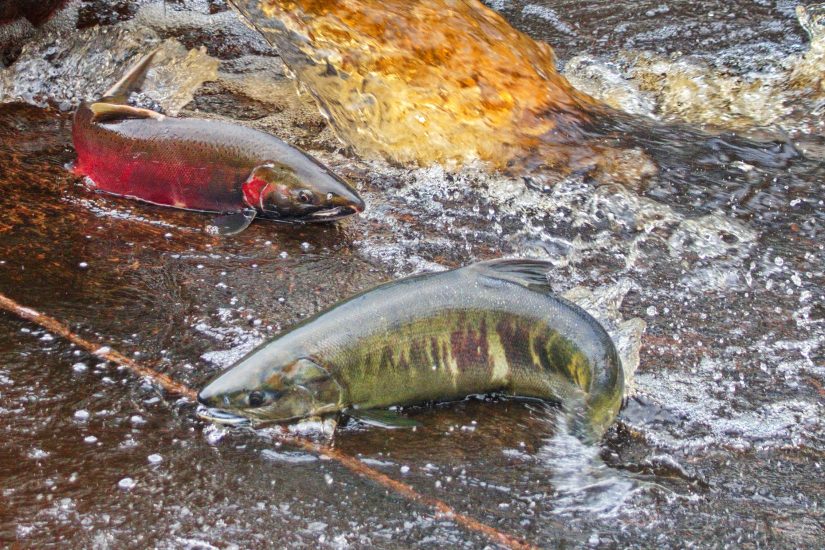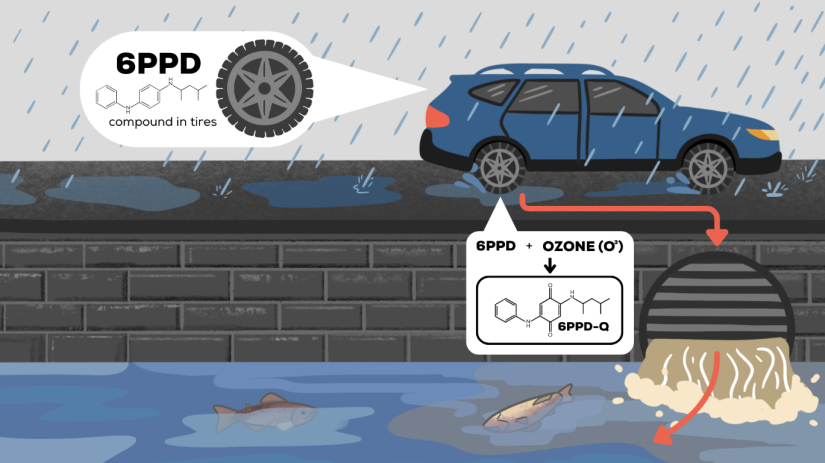Bringing to life the story of Pacific salmon and their recovery challenges
In a StoryMap bringing to life the challenges faced by Pacific salmon, SAFS graduate student, Amirah Casey, dives into the role of urban stormwater runoff and climate change in hindering salmon recovery.
Pacific salmon and Steelhead are vital to many parts of life in the Pacific Northwest, and across western North America. From recreational and commercial fisheries that benefit humans, to providing a food source for birds and marine mammals, while also being central to the cultures of Indigenous Peoples, these species are integral in this part of the world. Historically low abundances led to research which revealed a unique threat to them: polluted stormwater runoff and the presence of the chemical 6PPD-q, which comes from when the chemical 6PPD in vehicle tires reacts ozone in the air.

“I have always been interested in how humans impact the environment, and my interest in urbanization and climate change really blossomed in high school,” Amirah shared. “My jumpstart into research began when I took the first ever class as part of the Marine and Coastal Science cohort at Western Washington University (WWU), taught by Dr. Jim Cooper. He taught us about POP’s (persistent organic pollutants) and I was soon working in his lab with chemicals like PCBs and PBDEs.”
After joining the SAFS graduate program, Amirah became a member of the Applied Ecology Lab, advised by Dr. Mark Scheuerell, and reached out to the program manager of the NOAA Ecotox team—Dr. Nat Scholz—to see if there were any opportunities to collaborate. “I told him my two biggest interests were the effects of urbanization and climate change on our natural systems and how I wanted to be a part of the solution. That is when he said: “Oh yeah, you’re one of us” and we have been working together ever since,” Amirah said.
Amirah’s collaborators at the NOAA Northwest Fisheries Science Center (NWFSC) Ecotoxicology Program had an old StoryMap on their website and the EPA website, dating from before 6PPD-q was discovered. Amirah decided she would take on the project of revamping the StoryMap with updated science and engaging elements to share more widely about the stressors that Pacific salmon are facing. “The impacts of stormwater runoff on species like Coho salmon are undeniable,” Amirah said. “Up to 90% mortalities in urban watersheds after storm events is completely unsustainable if there is any hope of recovering these species, and that’s why I became so interested in how these two stressors (urbanization and climate change) impact Pacific salmon.”

Two big elements were new in Amirah’s version of the StoryMap. One was updated information, compiled over decades of research on this topic by the NOAA Ecotox team. “My role in this project was to sort through all the folders of images and videos collected by NOAA and select which would tell the best story, and likewise go through linked resources such as articles, YouTube videos and peer-reviewed literature that would support readers looking for more information,” Amirah said. “As someone who has worked on stormwater for so many years, the insights and narratives provided by Nat Scholz were invaluable in telling this story.”
The second new element were original graphics, videos and photographs, created and taken by Samantha-Lynn Martinez, a recent graduate of the UW Marine Biology program. “I met with Samantha-Lynn during a SEAS outreach event, and she had shared some of her work with salmon and stormwater, and a lightbulb went off in my head,” Amirah shared. “I really wanted to be able to work with her to take images and videos, and create graphics for the StoryMap—and get paid for her work—so that’s when I applied for the Future Rivers support funding and was able to hire Samantha-Lynn for her amazing graphic design and photography.”
Check out the easily accessible and engaging StoryMap, “Pacific Salmon at a Crossroads”, to learn more about the story of urban stormwater runoff and climate change, and to dive in to more resources and open-source papers on the subject.